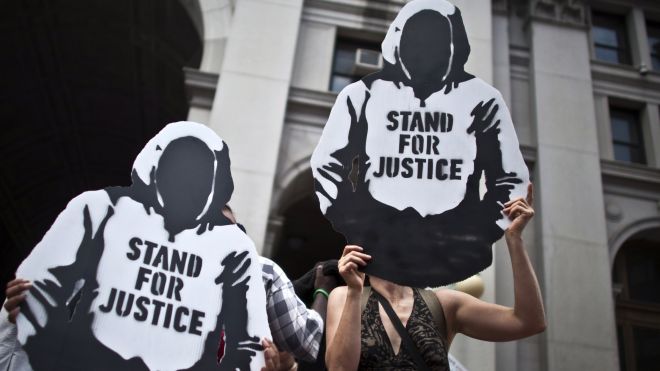Despite Zimmerman Verdict Outcry, Repeal Of Stand-Your-Ground Laws Unlikely

 Despite an outcry from civil rights groups, a call for close examination by President Barack Obama and even a 1960s-style sit-in at the Florida governor’s office, the jury’s verdict that George Zimmerman was justified in shooting unarmed teenager Trayvon Martin is unlikely to spur change to any of the nation’s stand-your-ground self-defense laws.
Despite an outcry from civil rights groups, a call for close examination by President Barack Obama and even a 1960s-style sit-in at the Florida governor’s office, the jury’s verdict that George Zimmerman was justified in shooting unarmed teenager Trayvon Martin is unlikely to spur change to any of the nation’s stand-your-ground self-defense laws.
“I support stand your ground,” Republican Arizona Gov. Jan Brewer said last week.
“I do not see any reason to change it,” said Georgia Gov. Nathan Deal, also a Republican.
At least 22 states have laws similar to that in Florida, according to the National Conference of State Legislatures. Many are conservative and lean toward laws that defend gun owners’ rights. So far, there does not appear to be an appetite in Florida or other states to repeal or change the laws, which generally eliminate a person’s duty to retreat in the face of a serious physical threat. In fact, some states are moving in the opposite direction.
“The debate about stand-your-ground laws largely reproduces existing divisions in American politics, particularly between blacks and whites and between Democrats and Republicans,” said John Sides, associate professor of political science at George Washington University.
Zimmerman, a 29-year-old former neighborhood watch volunteer, was acquitted this month of second-degree murder and manslaughter charges in the 2012 shooting of 17-year-old Martin in a gated community in Sanford, Fla. Zimmerman told police he shot Martin only after the African-American teenager physically attacked him; Martin’s family and supporters say Zimmerman, who identifies himself as Hispanic, racially profiled Martin as a potential criminal and wrongly followed him.
Zimmerman’s lawyers decided not to pursue a pretrial immunity hearing allowed by Florida’s stand-your-ground law. But jurors were told in final instructions by Circuit Judge Debra Nelson that they should acquit Zimmerman if they found “he had no duty to retreat and had the right to stand his ground and meet force with force, including deadly force if he reasonably believed that it was necessary.”
Before the stand-your-ground law was passed in 2005, the instruction would have read that Zimmerman “cannot justify his use of force likely to cause death or great bodily harm if by retreating he could have avoided the need to use that force.”
Since the law was enacted, justifiable homicides in Florida have risen from an annual average of 13.2 between 2001 and 2005 to an average of 42 between 2006 and 2012, including a record 66 in 2012, according to the Florida Department of Law Enforcement. FBI data have shown similar increases in some states that enacted similar laws, such as Texas, while others haven’t seen an uptick.
Beyond Florida, these states have some form of a stand-your-ground law, according to the national group: Alabama, Alaska, Arizona, Georgia, Indiana, Kansas, Kentucky, Louisiana, Michigan, Mississippi, Montana, Nevada, New Hampshire, North Carolina, Oklahoma, Pennsylvania, South Carolina, Tennessee, Texas, Utah and West Virginia.
Attorney General Eric Holder, in a speech last week to the NAACP convention in Orlando, said the Martin shooting demonstrates a need to re-examine stand-your-ground laws nationwide. He said they “senselessly expand the concept of self-defense” and increase the possibility of deadly confrontations.














